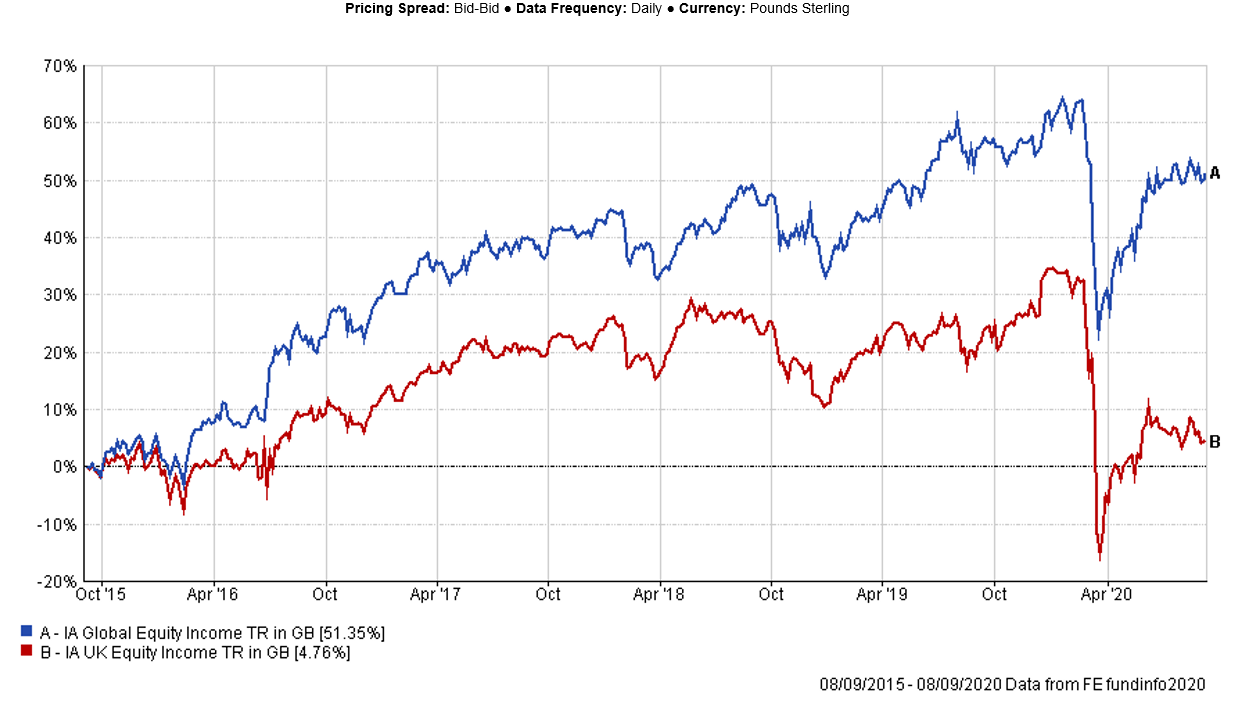How it has paid for income investors to broaden their horizons
Income-seekers that picked global funds over UK funds have been rewarded.
17th September 2020 10:35
by Faith Glasgow from interactive investor
Faith Glasgow crunches the numbers and explains the big performance gap between global equity income and UK equity income funds.

Historically, British investors have focused primarily on their home stock market - channelling their money into familiar businesses and avoiding the complications of foreign markets and exchange rate issues.
Income investors had an additional motivation in the shape of the UK’s long-established dividend culture, which simply didn’t exist overseas to anything like the same extent. UK equity income funds were seen as providing solid, relatively secure exposure to the market, primarily through big, well-established companies, with dividends as a valuable panacea when capital growth was hard to come by.
However, the dividend landscape has shifted significantly over the past 10 or 15 years, shaped by rock-bottom interest rates that forced cautious income-seekers higher up the risk spectrum, and by rapid globalisation. As a consequence, income-focused investors are these days more than likely to have reduced their UK equity income holdings in favour of a decent slug of funds with a global equity income mandate.
- Following the collapse in dividends, is growth the new income?
- Income hunters can find great funds on ii’s Super 60 recommended list of investments
It is certainly a trend that has paid off in terms of total returns. Figures from FE fundinfo show that over the past six months (to 8 September 2020), the Investment Association (IA) UK Equity Income sector lost 9.3%; in contrast, the IA Global Equity Income sector achieved a small gain of 2%.
That outperformance is evident across longer timeframes, too. On a three-year perspective UK-focused funds are down 13%, while those with a global mandate are up almost 9%; over five years the figures are even more stark, with gains of just 6% for the former against more than 50% for the latter.
It is worth noting, however, that the bulk of the differential has taken place this year and in 2016. There was less than 2% difference in returns between the two in 2019 or 2017, less than 5% in 2018; but global equity income funds outperformed by around 14% in 2016, the year of the EU referendum, and by more than 16% year to date in 2020.

What is underlying the trend? Most obviously, the vote for Brexit in 2016 left UK plc floundering, and ongoing concerns around the UK’s departure from the EU since then have deterred investors.
Gary Potter, co-head of multi-manager at BMO, points also to the fact that as globalisation has occurred. He says:
“The UK has little in the way of more modern industries, so it has not participated in investors’ preoccupation with growth companies, particularly tech businesses”.
This year has seen that phenomenon compounded, as the pandemic has massively fuelled demand for enterprises facilitating home and work life online: the technology-oriented Nasdaq index is up around 20% year to date, even after its correction of recent days, while the IA Global Equity Income sector has lost around 5% and IA UK Equity Income 22%.
In the short term, the impact of Covid-19 has undoubtedly dealt UK-focused income-seekers a huge additional body blow, as British companies across the board have been forced to cut, suspend or cancel dividends. Over the past six months around 445 companies listed on the London Stock Exchange have taken such measures, including around half the FTSE 100, half the FTSE 250 and 139 AIM businesses, according to ETF provider GraniteShares.
In fact, the UK’s dividend culture had been storing up trouble for itself well before Covid-19. For a start, as Darius McDermott, managing director of FundCalibre, points out: “Many companies had got into the bad habit of increasing dividends to please investors, rather than necessarily doing what was right for the company. Dividends should be paid out of excess profits, not from debt.” That left them all the more vulnerable when the crisis struck this year.
Any attempt by investors at better diversification means looking internationally. This has become a more attractive option as companies in other regions without the longstanding dividend tradition of the UK – particularly in Asia – have increasingly recognised the benefits of rewarding shareholders with regular payouts.
In effect, then, income-seekers have had good reason to turn their backs on the “old-fashioned” UK index to some extent, in favour of the prospect of much greater diversification and less decimation from an international equity income portfolio.
Opinion is divided on how far that trend is likely to continue in the future, however. Alex Crooke, manager of Bankers investment trust, still holds around 20% of the portfolio in the UK; but he believes that even if some kind of trade deal is struck with the European Union, issues around Brexit are likely to dog Britain’s economy for at least the next couple of years, dampening domestic demand and inhibiting inward investment.
Crooke makes the further point that the UK’s stock market is heavily skewed towards financials and industrials. “Other markets are more balanced and give greater access to growth industries,” he comments.
Importantly, exposure to growth sectors such as technology no longer precludes income-generation. “For example, Microsoft (NASDAQ:MSFT) could be considered a dream income stock – it pays a reliable and growing dividend,” he adds. In contrast, traditional cyclical sectors such as financials and oil companies form the mainstay of UK payouts.
It is worth underlining the fact that it is not realistic simply to replace lost UK dividends with those from overseas, as most other regions do not pay as generously. But Asia is not far behind, and that’s where Crooke is finding the best equity income opportunities.
“China has around a 3% dividend yield - it is seeing a mini tech boom but it also has some very interesting income companies with good growth, and Taiwan is interesting for similar reasons.”
Emerging markets also offer opportunities, but their currencies are less stable than those of their Asian counterparts.
However, other commentators take a different view, forecasting better times ahead for the battered UK market. Potter believes that the global tech stock boom is coming to an end, and that with eventual improvements in the Covid-19 situation and fiscal stimulation, the great value now available in the UK’s more conventional dividend-paying industrial and other cyclical businesses “will start to look interesting.
“If we got a bit of inflation, some good news on Brexit or a sharper recovery, we could see value strategies start to do better,” agrees McDermott. “The yield in the UK is still good, there are companies still paying and the stock market is very unloved, so there is still value to be found.”
In addition, he points out that this year’s dividend cuts can be seen as an opportunity for UK companies to reset dividends to a more sustainable level, and also to start reinvesting in the business again. Potter agrees:
“They may not pay out as much as historically and instead reinvest more, but I think if Covid-19 can be solved there are many sound businesses that will revert to their long-term trend.”
A key practical question, of course, is how long a turnaround might take for the UK equity income funds. Potter suggests that maybe 12 to 15 months down the road, as the economy recovers and dividends start to be paid once more, “UK equity income might start to top the sector charts again”. He adds: “The UK equity income sector is on its knees, but i don’t think the gap will be as big in six months’ time.”
McDermott takes a similar line. “I think the UK is the dark horse of investments at the moment. Everyone hates it and just a bit of good news could see it catch up with other regions.” The big unknown is just how long that good news will take to arrive.
Whatever happens, though, it is unlikely that equity income investors will revert to their UK-centric portfolios of old.
Funds for a global equity income
At FundCalibre, Darius McDermott favours Asia and emerging markets, suggesting Schroder Asian Income and Jupiter Asian Income as good choices. “Guinness Emerging Markets Equity Income is another option, although obviously higher risk,” he adds.
BMO’s Gary Potter also makes use of Schroder Asian Income, alongside other regionally focused funds including Montanaro European Income and CC Japan Income & Growth (LSE:CCJI).
Potter suggests Fidelity Global Enhanced Income for investors looking for a single income-oriented one-stop shop.
Global investment trusts such as Murray International (LSE:MYI), one of interactive investor’s Super 60 funds, have the added bonus that they can draw on revenue reserves to cover payouts in difficult years.
- Bruce Stout warns of volatile markets for the rest of the year
- Take control of your retirement planning with our award-winning, low-cost Self-Invested Personal Pension (SIPP)
Two other actively managed global equity income funds feature in interactive investor’s Super 60: Fidelity Global Dividend and Morgan Stanley Global Brands Equity Income.
These articles are provided for information purposes only. Occasionally, an opinion about whether to buy or sell a specific investment may be provided by third parties. The content is not intended to be a personal recommendation to buy or sell any financial instrument or product, or to adopt any investment strategy as it is not provided based on an assessment of your investing knowledge and experience, your financial situation or your investment objectives. The value of your investments, and the income derived from them, may go down as well as up. You may not get back all the money that you invest. The investments referred to in this article may not be suitable for all investors, and if in doubt, an investor should seek advice from a qualified investment adviser.
Full performance can be found on the company or index summary page on the interactive investor website. Simply click on the company's or index name highlighted in the article.